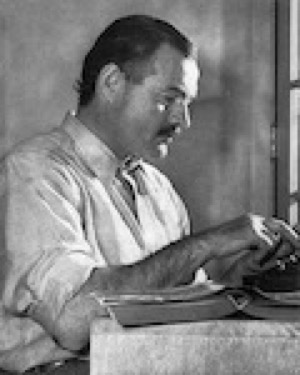Literary Critique - Hills Like White Elephants
May/26/2016 12:05 PM Filed: Literary Critiques

Photo Credit: Lloyd Arnold
(Wikimedia Commons)
Ernest Hemingway and Understatement
Understatement is characteristic of Hemingway. With a background in journalism, he wrote in a tight, distinctive style. His sentences are concise. His descriptions are straightforward. His dialogue is a rapid, back-and-forth delivery typical of real life.
Even when a story shows ambiguity, as seen in “Hills Like White Elephants,” a conclusion may be found in subtle narrative statements or pieces of dialogue. In a serious, though casual manner, a man is discussing abortion with his laid-back, pregnant girlfriend. He doesn’t want to push the procedure if she doesn’t want to do it. At the heart of this conversation is fear of losing freedom, as well as dread of taking responsibility for an unborn child.
The woman drinks through the scene in a Spanish cafe, and although it sounds as though both have agreed to abortion, the end hints at a different decision. “I feel fine,” she said. “There’s nothing wrong with me. I feel fine.”
Published in 1927, this frank discussion of a woman’s right to terminate a pregnancy was not typical of the decade of Prohibition and flappers. Racy feminists asserted their independence by drinking, smoking, and engaging in sex, but abortion was taboo. Hemingway’s portrayal of this woman is far from trite, even as he depicts her shrugging the matter off.
Or maybe she hasn’t. Her last statement indicates something is resolved in her mind. Asserting there’s nothing wrong could mean she has decided not to intervene, meaning no abortion. Perhaps Hemingway left his story subject to interpretation. Everyone will see a different conclusion, not a lack of resolution.